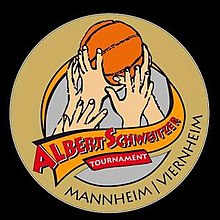Loading AI tools
International basketball event in Mannheim, Germany From Wikipedia, the free encyclopedia
The DBB Albert Schweitzer Tournament (German: Albert-Schweitzer-Turnier, abbreviated as AST), full name DBB Albert Schweitzer World Under-18 Tournament (German: DBB Albert Schweitzer Welt-Unter-18-Turnier), is an international basketball competition that is played between national teams of the Under-18 men's age category. It takes place every two years in Mannheim, Germany, and is contested between teams from 12 countries.
 | |
| Sport | Basketball |
|---|---|
| Founded | 1958 |
| No. of teams | 12 |
| Country | |
| Continent | |
| Most recent champion(s) | (2nd title) |
| Most titles | (10 titles) |
| Official website | ast.basketball-bund.de |
The organizers of the tournament are the German Basketball Federation (German: Deutscher Basketball Bund, abbreviated as DBB), and the city of Mannheim. The tournament is named after Albert Schweitzer. Since FIBA does not organize an Under-18 world championship, the Albert Schweitzer Tournament is internationally recognized and considered an official non-FIBA organized world championship for the Under-18 age group. From 1958 to 1993, the tournament was an Under-19 age competition. Since 1994, it has been an under-18 age competition.




The first Albert Schweitzer Tournament took place in December 1958. It was contested between eight teams, and won by Belgium. Hans-Joachim Babies, and the German basketball pioneer, Hermann Niebuhr, asked the theologian and physician, Albert Schweitzer, if they could use his namesake for the name of the tournament. After the second tournament in 1960, there was a break in play until 1966. From that point onwards, a two-year tournament cycle was established.
From 1958 to 1971, Team USA used players that were the dependents of the USA's military forces. Starting with the 1973 tournament, Team USA began to use players that were selected from throughout the entire USA high school system.
The 1991 tournament was canceled, due to the Gulf War. In 1994, the tournament switched from an Under-19 competition, to an Under-18 competition, and has since been held during even-numbered years.[1]
The USA has won the most titles, winning ten. The USA is followed by Italy with four titles. The tournament's record attendance so far was 28,763 spectators. Due to the spread of COVID-19, the 2020 tournament was cancelled.[2] Due to COVID-19, the 2022 tournament was also cancelled.[3] The tournament resumed in 2004.[4]
Country |
Winners |
|---|---|
10 | |
4 | |
2 | |
2 | |
2 | |
2 | |
2 | |
2 | |
1 | |
1 | |
1 | |
1 |
The tournament is an important event for professional basketball scouts from around the world. Over the years, many players who have played at the tournament have gone on to become well-known pro players, both in the NBA, and the EuroLeague.[13][14]
Some of the NBA players who have played at the AST are:
In addition, some of the players who have played in various international senior men's professional top-tier national domestic leagues and who have also played at the AST are:
| Year | MVP |
|---|---|
1996 | |
1998 | |
2000 | |
2002 | |
2004 | |
2006 | |
2008 | |
2010 | |
2014 | |
2016 | |
2018 | |
2024 |
The Burkhard Wildermuth Prize, or Burkhard Wildermuth Award, was first awarded in 2006, and is given to the player in each tournament that is deemed to be the "Most Talented Player". The award is named after Dr. Burkhard Wildermuth, the long-time co-organizer of the Albert Schweitzer Tournament.
| Year | Most Talented Player |
|---|---|
2006 | |
2008 | |
2010 | |
2014 | |
2016 | |
2018 | |
2024 |
Seamless Wikipedia browsing. On steroids.
Every time you click a link to Wikipedia, Wiktionary or Wikiquote in your browser's search results, it will show the modern Wikiwand interface.
Wikiwand extension is a five stars, simple, with minimum permission required to keep your browsing private, safe and transparent.